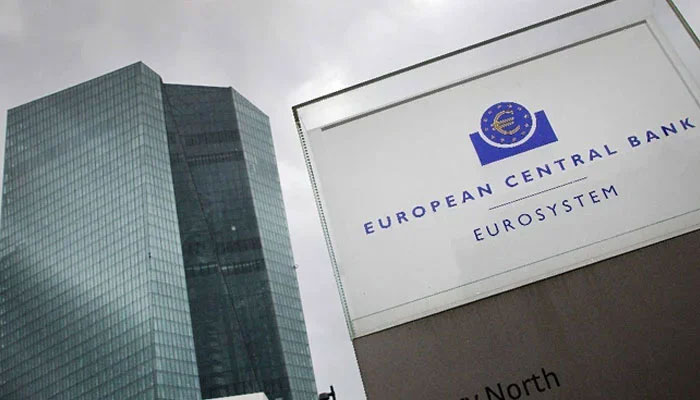European bank shares hit six-year high on surging profits and returns
As a result, the average return on equity among European banks has risen to 13 percent
London/New York: European bank shares have hit a six-year high after lenders promised record shareholder returns and profits surged thanks to rising interest rates.
The Stoxx Europe 600 Banks index reached its highest level for six years on Thursday, the last trading day before Easter in most markets, and is up 34 percent over the past year. According to analysts at Barclays, the continent’s banks are outperforming US rivals for the first time in more than a decade in return on equity terms.
“European bank fundamentals look stronger than ever,” said the bank’s head of European equity strategy Emmanuel Cau.
The Stoxx high coincides with strong fourth-quarter results for UniCredit, Santander and Lloyds Banking Group.
Shares in UBS, which last year took over its collapsed rival Credit Suisse in a deal that wiped out $17bn of debt, have done particularly well, rising 46 per cent over the past 12 months to their highest level since March 2008. Italian banks UniCredit and Intesa Sanpaolo have reached 13 and nine-year highs respectively.
Despite weak dealmaking activity and a fall in loan demand, 2023 was one of the most profitable years for European banks because of rising interest rates.
As a result, the average return on equity among European banks has risen to 13 per cent, Barclays analysts said.
However, if the European Central Bank and Bank of England begin cutting rates later this year, as is expected, “net interest income” — the difference between the interest that banks pay on deposits and receive from loans and the main source of their profits — is likely to come under pressure.
“The timing and pace of interest rate cuts will affect the banks’ performance in 2024,” said Rafael Quina, head of French, Italian and Portuguese banks at Fitch Ratings. “Pressure on net interest margins could increase in 2025 as interest rates will have fallen further.”
But he also noted that business activity would increase and loan impairment charges fall if economic growth prospects improve and that this would support banks’ profitability.
Despite their strong recent performance, European banks are still heavily undervalued compared to their US peers, which have grown faster and been more profitable since the financial crisis.
As part of efforts to address this valuation gap and to win back investors spooked by dividend bans and windfall taxes since the pandemic, European lenders have promised to return more than €120bn to shareholders this year, through €74bn of dividends and €47bn of share repurchases.
This is a 54 per cent increase on the previous year’s capital returns and far higher than every year since at least 2007, according to figures compiled by UBS.
One of the biggest distribution announcements this year was from UniCredit, whose shares have more than doubled over the past year. It has promised to pay €8.6bn — its entire profit for 2023 — to investors.
Wells Fargo bank analyst Mike Mayo said it made sense for banks with healthy levels of capital to return money to shareholders when profits were high.
“Do these banks have enough capital to see out an extreme adverse scenario? The answer to that question alone drives whether or not they should be buying back stock,” he said.
-
 Critics Target Palace Narrative After Andrew's Controversy Refuses To Die
Critics Target Palace Narrative After Andrew's Controversy Refuses To Die -
 Sarah Ferguson’s Delusions Take A Turn For The Worse: ‘She’s Been Deserted’
Sarah Ferguson’s Delusions Take A Turn For The Worse: ‘She’s Been Deserted’ -
 ICE Agents 'fake Car Trouble' To Arrest Minnesota Man, Family Says
ICE Agents 'fake Car Trouble' To Arrest Minnesota Man, Family Says -
 Camila Mendes Reveals How She Prepared For Her Role In 'Idiotka'
Camila Mendes Reveals How She Prepared For Her Role In 'Idiotka' -
 China Confirms Visa-free Travel For UK, Canada Nationals
China Confirms Visa-free Travel For UK, Canada Nationals -
 Inside Sarah Ferguson, Andrew Windsor's Emotional Collapse After Epstein Fallout
Inside Sarah Ferguson, Andrew Windsor's Emotional Collapse After Epstein Fallout -
 Bad Bunny's Star Power Explodes Tourism Searches For His Hometown
Bad Bunny's Star Power Explodes Tourism Searches For His Hometown -
 Jennifer Aniston Gives Peek Into Love Life With Cryptic Snap Of Jim Curtis
Jennifer Aniston Gives Peek Into Love Life With Cryptic Snap Of Jim Curtis -
 Prince Harry Turns Diana Into Content: ‘It Would Have Appalled Her To Be Repackaged For Profit’
Prince Harry Turns Diana Into Content: ‘It Would Have Appalled Her To Be Repackaged For Profit’ -
 Prince William's Love For His Three Children Revealed During Family Crisis
Prince William's Love For His Three Children Revealed During Family Crisis -
 Murder Suspect Kills Himself After Woman Found Dead In Missouri
Murder Suspect Kills Himself After Woman Found Dead In Missouri -
 Sarah Ferguson's Plea To Jeffrey Epstein Exposed In New Files
Sarah Ferguson's Plea To Jeffrey Epstein Exposed In New Files -
 Prince William Prepares For War Against Prince Harry: Nothing Is Off The Table Not Legal Ways Or His Influence
Prince William Prepares For War Against Prince Harry: Nothing Is Off The Table Not Legal Ways Or His Influence -
 'How To Get Away With Murder' Star Karla Souza Is Still Friends With THIS Costar
'How To Get Away With Murder' Star Karla Souza Is Still Friends With THIS Costar -
 Pal Reveals Prince William’s ‘disorienting’ Turmoil Over Kate’s Cancer: ‘You Saw In His Eyes & The Way He Held Himself’
Pal Reveals Prince William’s ‘disorienting’ Turmoil Over Kate’s Cancer: ‘You Saw In His Eyes & The Way He Held Himself’ -
 Poll Reveals Majority Of Americans' Views On Bad Bunny
Poll Reveals Majority Of Americans' Views On Bad Bunny




